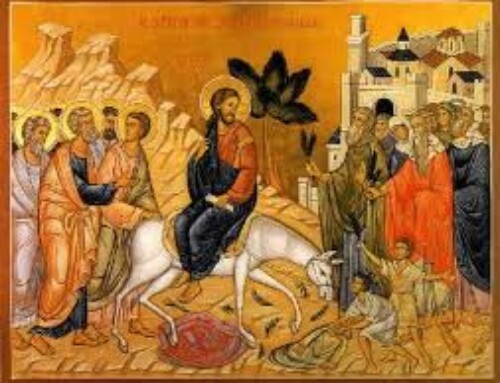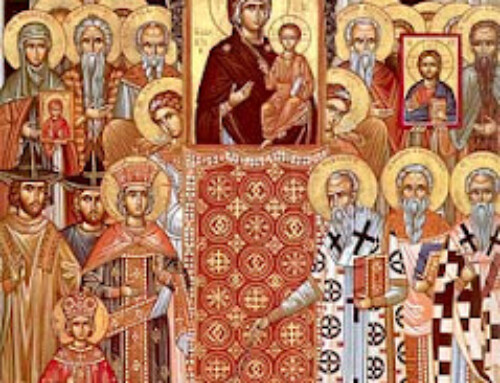The Word Magazine, March 1959, Page 3-4
LENT
A Time of Decision
by REV. FR. THEODORE E. ZITON
Pastor, St. Nicholas Orthodox Church Montreal, Quebec, Canada
Lent works up a crow of images in our imaginations. For some it evokes a time of sadness, a gloomy countenance. For others, a time of continual remorse for the penance they do not do. But Lent need not be gloomy: it is not something negative and outmoded. It is something gloriously, adventurously positive. It is a time of spiritual growth and though all growth is painful— “Nothing grows but something dies” (Khalil Gibran) yet it is joyous because it is a sign of life, and life is divinely joyful. Lent is a joyous and virile battle waged after the example of Christ and in union with Him against the enemy of life.
Forty days is long. To understand the duration of Lent we must refer to the Bible whence it takes its source. The number forty commemorates the forty years the Jews spent in the desert, the forty days that Moses and Elias spent on the Mountain of God before concluding the Alliance with God, the forty days that Christ spent in the desert in prayer and fasting before beginning His public life. And more specifically in the Greek Orthodox Church the Great Fast which the Church observes for forty days begins on the Monday after Cheese Fare Sunday. March 16, 1959, and ends on the evening of the Friday before Palm Sunday, April 24, 1959. The Saturday preceding Palm Sunday is called Lazarus Saturday, and is dedicated to the remembrance of Christ’s raising of Lazarus from the dead. Holy Week, which is also called Great Week or Passion Week, beginning on the eve of April 26th, 1959, is a special Fast in honor of our Lord’s own Passion.
Before beginning His mission that was to lead Him to Calvary, Christ wished to reflect, to meditate, to pray in the solitude of the desert. Sent here below to conquer the Prince of this world, He accepted to be tempted by him and to cross swords with him. This first meeting was not to be the definitive battle of Calvary but a preliminary encounter to test the strength of His adversary. St. Luke describes the outcome of their first meeting: “And all the temptation being ended, the devil departed from Him for a time” (LUKE 4:13). Christ tested His arms — prayer, fasting and humility — and found them effective. Later on in His public life His Disciples were to ask Him why they had not been able to expel the demon from the body of a young boy. “And He said to them: ‘This kind can be cast out only by prayer and fasting’.” (MARK 9:29).
By crossing the Red Sea, the chosen people of old escaped the slavery of Egypt. Never-the-less they spent forty years in the desert before entering the Promised Land. We are God’s chosen people. We have escaped the slavery of Satan by the waters of Baptism; however we have not vet entered the Promised Land: we are still enroute.
Our lives as Orthodox Christians must be seen as a march in the desert of this world. Like the Hebrews of old, we run the risk of losing sight of the purpose of this journey and of forgetting our destination. Each year Lent serves to reanimate our hope, nourish our faith, awaken our charity, it puts before our eyes the meaning of our life, puts us again on the right road and helps us to advance joyfully on our way to the Promised Land—Heaven.
Lent, in the life of an Orthodox Christian, like the desert in the life of the Chosen People, is a time of decision. Once purified from their sin, the chosen people entered into the Promised Land; after his sojourn on the Mountain of God, Moses descended to be the Leader of his people and Elias regained his courage to undertake the difficult mission of Prophet to the Jewish people. Christ came out of the desert ready to begin His mission of salvation. Lent is the time for Orthodox Christians to choose for or against God.
Lent is a time of penance; but it is also a time of charity when God awaits our love. Our fasting, our prayers and our efforts to re-adjust our lives to the teachings of Christ are only exterior manifestations of a more profound inner life. Penance is not sought for itself; its purpose is to render us free to welcome Christ into our lives. Real penance does not limit itself to a mere list of “giving up” things; considered by itself “giving up” has no real value. We must always remember that our penitential practices are only means adopted to aid our conversion, a removal of obstacles so that we may better appreciate the things of God. We shut our ears to worldly distractions so as to better hear the voice of God telling us of His infinite love for each and every one of us.
A certain individual visiting America a few years ago remarked: “America is now under going the trial of abundance.” Our frantic pursuit of earthly goods risks to kill in us all hope in an after life and all belief in spiritual realities. A sufficient amount of earthly goods is necessary to the ordinary man to live virtuously but their pursuit must never become an end in itself. Slowly and surely, we in North America are slipping into a life of comfort and luxury. We are becoming the slaves of modern inventions. Those who do not possess the latest of everything are bitter because they cannot have what they don’t really need. We have swallowed the “big lie” of TV commercials which would have us believe that we cannot live happily without “Dreamo” or some such nonsense.
The church has decreased the rigors of Lent out of concern for our softened constitutions and other ideas that we have implanted in our minds. But because we may now fix the forms and limits of our Lenten penances ourselves, because of the land we live in, etc. that should not mean that we say “Goodbye” to all penance. We joyfully sacrifice our sleep for a night out, to watch the late show on TV or to finish a particularly thrilling mystery. Would our health really suffer were we to lose a little sleep through prayer, meditation, or at an extra Church Service during Lent? We don’t hesitate to part with our hard earned money to buy the latest TV set or new car. Would the pinch be too painful were we to sacrifice a few dollars to relieve the misery of the poor, to aid our Churches, or even support the needy refugees of the Middle East?
Christ has some helpful suggestions on what to give up: “And if thy hand, or thy foot offend thee, cut it off, and cast it from thee. It is better for thee to go into life, maimed or lame, than having two hands or two feet, and be cast into everlasting flame. And if thy eye offend thee. pluck it out, and cast it from thee. It is better for thee having one eye and enter into life, than two eyes and be cast into hell fire.” (MATT. 18 : 8-9). Christ tells us clearly to give up what is most dear or even most useful to us if it is an occasion of sin for us. It is up to us to make the practical application in our own lives. If TV is for you an occasion of sin, if it prevents you from rendering to God the things that are God’s, shut it off, for it is better for you to enter into life without having seen the latest programs than to be cast in hell fire. If the latest styles or creations are an cccasion for sin for you, cast them away, for it is better for you to enter into life poorly clad than to be cast into hell fire. If the latest Best Seller or Smash Hit are an occasion of sin for you, cast them away for it is better for you to enter into life without having read or seen the latest hit than to be cast into hell fire.
There are a host of penances that will not damage even the most fragile constitution — the renunciation of jealousy, bitterness, hatred, etc. Such penances require constant attention and effort which will perhaps leave us with a headache. We willingly put up with a headache for the pursuit of pleasure: shall we not endure as much for the pursuit of God?
– The important thing to remember in all our “giving up” is to reduce our worldly concerns and preoccupations to a minimum in order to find the time to seek God in prayer and meditation. The Christian life is a continual choice which tends our hearts. We must live either according to the spirit of Christ or the spirit of the world, of which Satan is the Prince. Christ tells us clearly: “No man can serve two masters..” .” The choice is ours; Lent is the time of that choice. It will not be easy. For each and every one of us it will be a repetition of Christ’s temptation in the desert. Satan will not stand by idly. Christ provides us with the arms. He is ever at our beck and call when we cry out to Him. He awaits but our decision to undertake the battle. If we choose for Him, Lent is our declaration of war. Lent, then, is a time of Decision.



